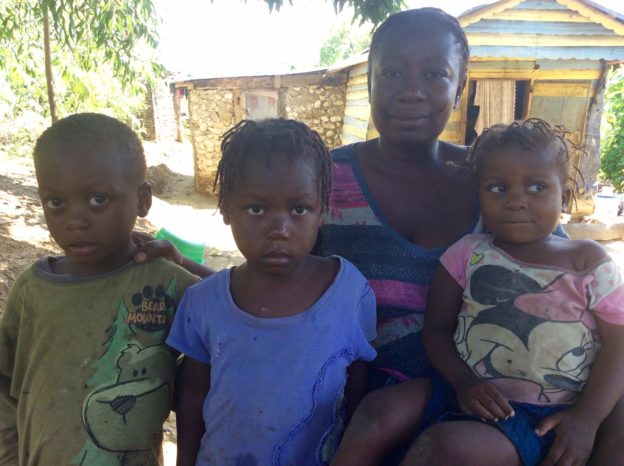Lourdine Magloire lives in Savann Donnen, a rural area just off the main road that leads from Mibalè to Pòtoprens. When she first got together with her partner, Derisnord, he was a widower with three children. They decided to raise the three together, and Lourdine eventually had their fourth.
They remained a medium-sized, poor family for several years. Derisnord brought in a small income with day labor, working their neighbors’ fields. With no livestock and no land holdings beyond the small plot the couple lived on, Lourdine’s best option was to work as a market woman, selling groceries at the weekly markets in Labasti, Mache Kana, and Ti Sèkèy. Labasti is close by, but the others our long hikes from Savann Donnen, so she would rent a horse to make the trips.
Then Lourdine became pregnant again, and the couple awaited what they expected would be their fifth child. Except that Lourdine had triplets.
The event made their already-difficult life even harder. Lourdine spent months unable to leave her home to manage her business. All the capital she had in it quickly wasted away. The entire household was left to live off Derisnord’s agricultural earnings. Field labor typically pays 50 gourds per day. That may have been worth a little more than $1 at the time, though it’s now worth less than eighty cents. The international definition of “extreme poverty” is now $1.90 per day, and that’s per household member. Derisnord was earning about a dollar when he could find the work, and that was for the whole family.
Lourdine joined the CLM program in 2013. The triplets were just about a year old. She knew she wouldn’t be able to restart her business. She was too busy nursing. So she chose livestock – two female goats and a young sow – as her assets.
Savann Donnen is a good place to raise livestock. There are areas to let goats graze, and food to scavenge for pigs. You don’t have to buy everything you feed them. Thanks to Lourdine’s hard work, the livestock prospered. Her goats had kids, and her pig had piglets. She was able to use proceeds from sales of the young to manage some of her household’s needs. The kids began to eat well, and she sent the third and fourth ones to school.
As she developed her new businesses, she learned to count on the weekly visits she’d receive from her case manager, Guerrier. “He really pushes you because he doesn’t want you to slip back to the way you were.”
the time she graduated in December 2014, she had more than achieved her first big goals. Her children were healthy, the older ones were in school, and she had purchased a cow by selling off some of her animals’ young. And two years after that, her progress continues. The triplets are now in school as well, and she’s just purchased her second cow.
She still has challenges. Though she has valuable livestock holdings and plenty of food for herself and her children to eat, she can be short on cash. The day I saw her, she was running around trying to borrow the 100 gourds she needed to take a taxi to the hospital in Mibalè. She was due to renew her family planning. She knows that she needs to get back into small commerce to build a modest, regular cash flow, but the cost of getting all the children into school this year has left her without the funds she’d need to invest in a small business.
She’s thought about Fonkoze credit program, but the loans are group loans and doesn’t like the idea of borrowing with other women. “I’d think about it if the loan was individual.” For now, she plans to start buying cases of frozen chicken parts in the next couple of months, when she can sell off some more livestock to fund that first purchase.
She also has a larger vision. She thinks she can be a leader, and wants to get into local politics. “Right now, I’m just studying the lay of the land.” But she advocates strongly for CLM’s return to her neighborhood. She claims that there is a corner of it we missed. We’ll have to study what she says.
